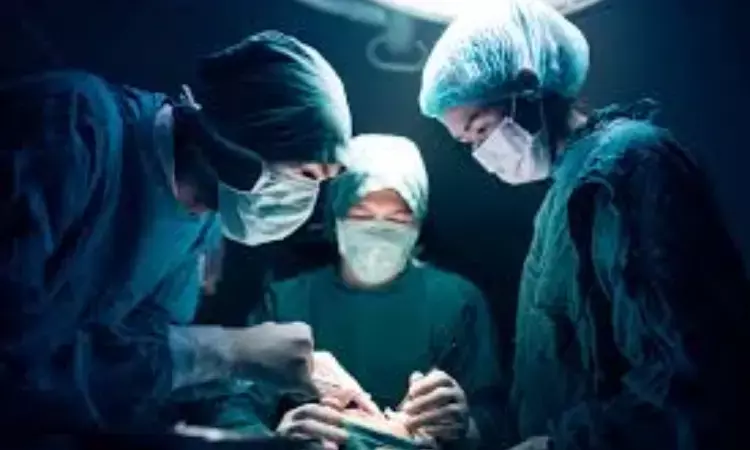- Home
- Medical news & Guidelines
- Anesthesiology
- Cardiology and CTVS
- Critical Care
- Dentistry
- Dermatology
- Diabetes and Endocrinology
- ENT
- Gastroenterology
- Medicine
- Nephrology
- Neurology
- Obstretics-Gynaecology
- Oncology
- Ophthalmology
- Orthopaedics
- Pediatrics-Neonatology
- Psychiatry
- Pulmonology
- Radiology
- Surgery
- Urology
- Laboratory Medicine
- Diet
- Nursing
- Paramedical
- Physiotherapy
- Health news
- Fact Check
- Bone Health Fact Check
- Brain Health Fact Check
- Cancer Related Fact Check
- Child Care Fact Check
- Dental and oral health fact check
- Diabetes and metabolic health fact check
- Diet and Nutrition Fact Check
- Eye and ENT Care Fact Check
- Fitness fact check
- Gut health fact check
- Heart health fact check
- Kidney health fact check
- Medical education fact check
- Men's health fact check
- Respiratory fact check
- Skin and hair care fact check
- Vaccine and Immunization fact check
- Women's health fact check
- AYUSH
- State News
- Andaman and Nicobar Islands
- Andhra Pradesh
- Arunachal Pradesh
- Assam
- Bihar
- Chandigarh
- Chattisgarh
- Dadra and Nagar Haveli
- Daman and Diu
- Delhi
- Goa
- Gujarat
- Haryana
- Himachal Pradesh
- Jammu & Kashmir
- Jharkhand
- Karnataka
- Kerala
- Ladakh
- Lakshadweep
- Madhya Pradesh
- Maharashtra
- Manipur
- Meghalaya
- Mizoram
- Nagaland
- Odisha
- Puducherry
- Punjab
- Rajasthan
- Sikkim
- Tamil Nadu
- Telangana
- Tripura
- Uttar Pradesh
- Uttrakhand
- West Bengal
- Medical Education
- Industry
Patients who have undergone appendectomy at higher risk of microscopic colitis: Study

Sweden: A recent study led by John Maret-Ouda and colleagues found a modestly higher chance of developing microscopic colitis (MC) after appendectomy. The findings of this study were published in Clinical Gastroenterology and Hepatology.
Microscopic colitis is a kind of inflammatory bowel disease that causes persistent diarrhea. Appendectomy may have immunomodulatory effects on the colon, lowering the risk of gastrointestinal illness. The link between appendectomy and MC has received little attention. As a result, this study was carried out to investigate the link between microscopic colitis and appendectomy.
In genetically predisposed individuals, the pathophysiology of microscopic colitis is thought to be associated with a dysregulated immune response in the gut mucosa, and infiltration of T-helper cells 17 (Th17) in the lamina propria of colon has indeed been observed, contributing that appendicitis has been related to upregulation of the Th17 pathway.
The study was a case-control study based on the countrywide ESPRESSO cohort, which included histopathological exams across Sweden that were connected to national registers. Individuals with MC were paired to population controls based on gender, age, biopsy year, and county of residence. The Patient Register was queried for information on previous appendectomy and comorbidities. Unconditional logistic regression models with odds ratios (ORs) and 95% confidence intervals (Cl) modified for country of birth and matching covariates were run. Sub-analyses were performed depending on MC subtypes (collagenous colitis [CC] and lymphocytic colitis [LC]), post-appendectomy follow-up time, and severity of appendicitis.
The key findings of this study were as follows:
1. The study comprised 14,520 instances of MC and 69,491 controls, with 7.6% (n=1,103) and 5.1% (n=3,510) having had an appendectomy 1 year prior to the MC/matching date, respectively.
2. Patients who had previously undergone an appendectomy had an elevated incidence of MC overall, as well as per subtype CC, LC.
3. The risk remained higher throughout the study, with non-complicated appendicitis having the highest risk.
Reference:
Maret-Ouda, J., Ström, J. C., Roelstraete, B., Emilsson, L., Joshi, A. D., Khalili, H., & Ludvigsson, J. F. (2022). Appendectomy and future risk of microscopic colitis: a population-based case-control study in Sweden. In Clinical Gastroenterology and Hepatology. Elsevier BV. https://doi.org/10.1016/j.cgh.2022.05.037
Neuroscience Masters graduate
Jacinthlyn Sylvia, a Neuroscience Master's graduate from Chennai has worked extensively in deciphering the neurobiology of cognition and motor control in aging. She also has spread-out exposure to Neurosurgery from her Bachelor’s. She is currently involved in active Neuro-Oncology research. She is an upcoming neuroscientist with a fiery passion for writing. Her news cover at Medical Dialogues feature recent discoveries and updates from the healthcare and biomedical research fields. She can be reached at editorial@medicaldialogues.in
Dr Kamal Kant Kohli-MBBS, DTCD- a chest specialist with more than 30 years of practice and a flair for writing clinical articles, Dr Kamal Kant Kohli joined Medical Dialogues as a Chief Editor of Medical News. Besides writing articles, as an editor, he proofreads and verifies all the medical content published on Medical Dialogues including those coming from journals, studies,medical conferences,guidelines etc. Email: drkohli@medicaldialogues.in. Contact no. 011-43720751


